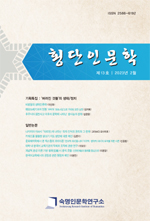필자는 ‘의미’, ‘의미 현상’, ‘의미이론’의 문제를 문화해석학의 차원에서 논의하려고 한다. 이는 기존에 소개된 영미 분석철학 전통의 의미이론(the theory of meaning)이나 유럽 현상학 전통의 의미론(semantics)의 논의 맥락과는 사뭇 다르다. 필자는 이 글에서 문화해석학에서 다루는 의미이론은 인간의 ‘언어적 의미’를 너머 인간과 동물에서 공통으로 나타나는 ‘지각적 의미’와 ‘행위적 의미’까지도 포함해야 한다는 사실을 주장하고자 한다. 먼저, ①의미는 인간의 언어적 의미 차원에서만 논의 가능하다는 관점, 다음으로, ② 동물도 인간과 마찬가지로 의미 형성의 주체로 인정해야 한다는 관점, 그리고 ③이 둘사이에서 필자는 말이 제시했던 유비의 해석학의 관점을 통해 ‘의미이론’을 논의해야 할 상황이 되었음을 제시하려는 것이다. 그런 측면에서 이 글은 시론적이라 할 수 있다. 이러한 맥락에서 여기에서는 생물학자 윅스퀼(Jakob von Uexküll)의 의미이론을 집중적으로 다루고자 한다. 그리고 윅스퀼의 의미이론에 대한 카시러의 평가와 문화해석학적 차원에서의 현재적 의의를 살펴보면서 논의를 맺도록 한다.
The purpose of this article is to deal with the concept of meaning, the phenomena of meaning, and the theory of meaning in terms of the Cultural Hermeneutics. So this study basically differs from the theory of meaning in tradition of the Analytic Philosophy and Semantics in the European Phenomenology. Both of them have something in common, especially in context of the linguistic meaning. But in this study we will discuss the perceptual meaning and the actional meaning in terms of the Cultural Hermeneutics in order to get over the linguistic meaning. In this context, we will discuss the problems as follows: Can only Human Being discover and pursuit the meaning? What is the difference between Human Being and Animals? Can only Human Being be the subject of creation of meaning? Can only Human Being enjoy the culture? So, I will argue that the theory of meaning in the Cultural Hermeneutics has to include the perceptual meaning and the actional meaning. In this context, I will intensively deal with Uexküll(1864-1944)’s the theory of meaning. Lastly I will discuss Cassirer(1874-1945)’s evaluation to the Uexküll’s view-points.
1. 여는 말
2. 야콥 폰 윅스퀼, 보이지 않는 세계의 그림책을 펼쳐놓다
3. 동물의 체험 공간들과 그 지각적 특징들
4. 환경세계는 또 다른 ‘의미’의 세계이다.
5. 모든 ‘대상’은 ‘의미의 담지자들’이다
6. 닫는 말: 아직도 ‘의미’는 인간만의 전유물이라고 할 수 있는가?
참고문헌
(0)
(0)
